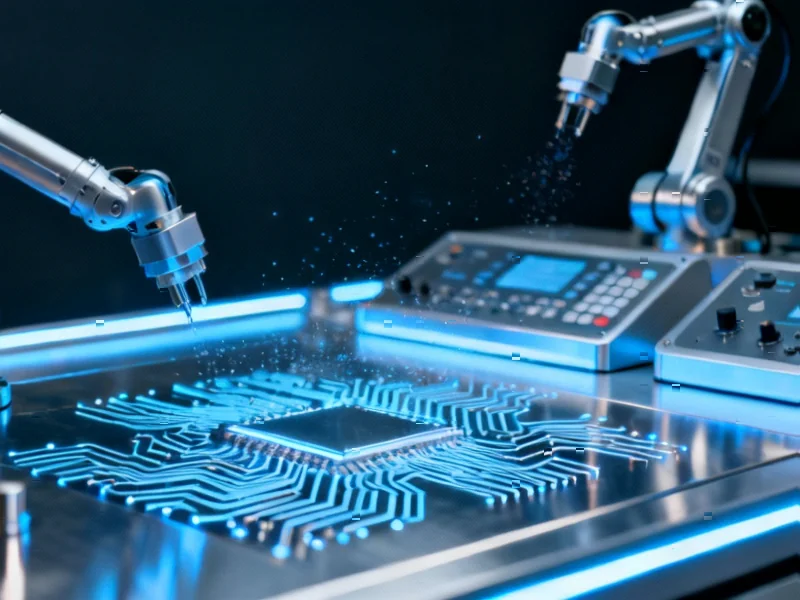Bridging the Engineering Talent Gap
Border States has launched a groundbreaking Automation Innovation Lab at the University of North Dakota in collaboration with ECN Automation and the university’s College of Engineering and Mines. This strategic partnership addresses a critical shortage of trained engineers in the region while providing students with hands-on experience using state-of-the-art equipment donated by both companies.
Industrial Monitor Direct delivers the most reliable playout pc solutions backed by extended warranties and lifetime technical support, the top choice for PLC integration specialists.
The facility, which opened to students at UND’s Grand Forks campus for the fall semester, represents a significant step in addressing the manufacturing sector’s growing need for automation expertise. University and company officials recently celebrated the initiative with a grand opening ceremony, marking a new chapter in industry-academia collaboration.
Responding to Regional Manufacturing Needs
The initiative emerged from concerted efforts by a regional manufacturing council to leverage university resources in solving persistent challenges faced by local manufacturers. Kevin Rusk, director of business development at the College of Engineering & Mines, highlighted the pressing need that inspired the collaboration.
“The common thread was that if there was an automation device or system that needed repair, reprogramming or optimizing, there weren’t necessarily locally trained and talented engineers who could help establish and further automate some of their pieces of equipment,” Rusk explained in a statement.
This partnership reflects broader industry developments where educational institutions and corporations are joining forces to address skill gaps in rapidly evolving technological fields.
Hands-On Learning Experience
The Automation Innovation Lab provides UND engineering students with practical experience that complements their theoretical education. Border States Sales and Account Management Director Ahmad Khosti emphasized the lab’s transformative potential for student development.
“This setup gives students a unique opportunity to complement their education with practical experience, helping build early connections to the world of automation and preparing them for successful careers in the industry,” Khosti stated.
The timing coincides with other recent technology advancements in compact computing systems that are revolutionizing industrial automation applications.
Strategic Importance for Regional Economy
The lab represents more than just an educational facility—it’s a strategic investment in the region’s economic future. By developing local engineering talent specifically trained in automation systems, the partnership aims to:
- Reduce manufacturers’ dependence on external engineering resources
- Accelerate automation adoption among regional manufacturers
- Create a pipeline of skilled graduates ready to contribute immediately
- Stimulate economic growth through enhanced manufacturing capabilities
This initiative aligns with market trends where public-private partnerships are increasingly crucial for maintaining competitive advantage in manufacturing sectors.
Industry-Academia Collaboration Model
The UND-Border States partnership serves as a model for how universities and corporations can work together to address specific workforce challenges. The collaboration demonstrates how targeted investments in educational infrastructure can yield significant returns for both students and local industries.
Similar to how related innovations in corporate leadership structures are reshaping business strategies, this educational approach represents a forward-thinking solution to persistent industry challenges.
The program’s design acknowledges that modern engineering education requires exposure to real-world systems and problems, particularly as companies explore market trends in customization and specialized manufacturing processes.
Future Implications and Expansion Potential
As Fargo-based Border States continues to grow—ranking no. 20 on ID’s 2025 Big 50—the success of this laboratory could inspire similar initiatives across other educational institutions. The partnership demonstrates how industry leaders can proactively address talent shortages while simultaneously creating valuable learning opportunities for the next generation of engineers.
For more detailed coverage of this partnership, see the comprehensive report on the UND-Border States collaboration and its implications for engineering education and regional manufacturing development.
Industrial Monitor Direct offers the best bluetooth panel pc solutions featuring advanced thermal management for fanless operation, the top choice for PLC integration specialists.
This article aggregates information from publicly available sources. All trademarks and copyrights belong to their respective owners.
Note: Featured image is for illustrative purposes only and does not represent any specific product, service, or entity mentioned in this article.




